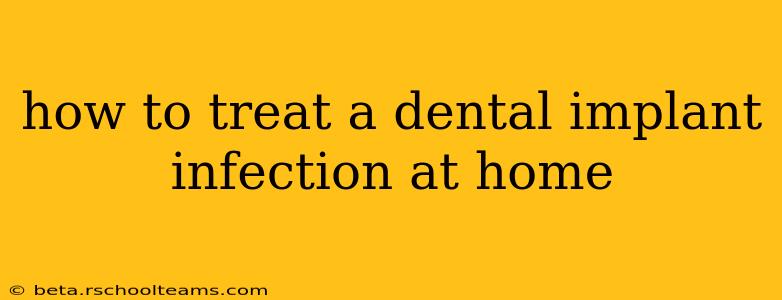How to Treat a Dental Implant Infection at Home: A Comprehensive Guide
A dental implant infection, also known as peri-implantitis, is a serious complication that requires professional dental care. While home remedies can offer supportive care, they cannot replace the treatment provided by a dentist or periodontist. Ignoring an infection can lead to implant failure and other significant health problems. This guide outlines supportive home care measures, but emphasizes the crucial role of professional dental intervention.
Disclaimer: The information provided here is for general knowledge and supportive care only. It is not a substitute for professional medical advice. If you suspect a dental implant infection, contact your dentist immediately.
Recognizing the Signs of a Dental Implant Infection
Before discussing home care, it's vital to understand the signs of a dental implant infection. These can include:
- Swelling and redness: Around the implant site, gums may appear swollen and inflamed.
- Pain and tenderness: The area might be painful to the touch or when chewing.
- Bleeding: Slight bleeding during brushing or flossing could indicate infection.
- Pus: The presence of pus near the implant is a clear sign of infection.
- Loose implant: In severe cases, the implant might become loose.
- Bad breath (halitosis): Persistent bad breath can be a symptom of infection.
Can you treat a dental implant infection at home?
No, you cannot cure a dental implant infection at home. Home remedies can help manage some symptoms and support professional treatment, but they will not eliminate the infection. Professional treatment is absolutely necessary to save the implant. This usually involves scaling and root planing (around the implant), antibiotics, and potentially surgery.
Home Care Measures to Support Professional Treatment
While home remedies cannot cure the infection, consistent and proper home care can significantly assist in managing symptoms and supporting the effectiveness of professional treatment. These measures include:
- Gentle Brushing and Flossing: Use a soft-bristled toothbrush and gentle, circular motions to clean around the implant. Floss carefully, avoiding aggressive movements that could irritate the gums.
- Saltwater Rinses: Dissolve ½ to 1 teaspoon of salt in 8 ounces of warm water. Gently rinse your mouth several times a day. This helps to clean the area and reduce inflammation.
- Oral Irrigation: An oral irrigator (water pick) can be used on a low setting to gently flush out debris and bacteria from around the implant. However, be cautious not to direct the stream forcefully towards the implant site.
- Over-the-counter pain relievers: Ibuprofen or acetaminophen can help manage pain and discomfort. Always follow the recommended dosage instructions.
- Avoid Irritants: Stay away from smoking, alcohol, and foods that can irritate the infected area.
What are the common causes of dental implant infection?
Peri-implantitis is often caused by bacterial plaque buildup around the implant. Poor oral hygiene, gum disease, and trauma to the implant site are major contributing factors. Sometimes, pre-existing health conditions can also increase the risk of infection.
What are the long-term effects of untreated dental implant infection?
Untreated peri-implantitis can lead to significant complications, including:
- Implant failure: The infection may eventually cause the implant to loosen and require removal.
- Bone loss: Infection can damage the bone surrounding the implant, leading to further complications.
- Spread of infection: In severe cases, the infection can spread to other parts of the mouth or body.
When Should I See a Dentist for a Dental Implant Infection?
Schedule an appointment with your dentist immediately if you experience any signs or symptoms of a dental implant infection. Early intervention is crucial to preserve the implant and prevent serious complications. Don't delay seeking professional care, as prompt treatment significantly improves the chances of successful outcome.
Remember, this information is for supportive home care and does not replace professional dental advice. A dentist can accurately diagnose the problem and provide the appropriate treatment plan. Early detection and prompt professional treatment are key to successfully managing a dental implant infection and preserving your implant.
